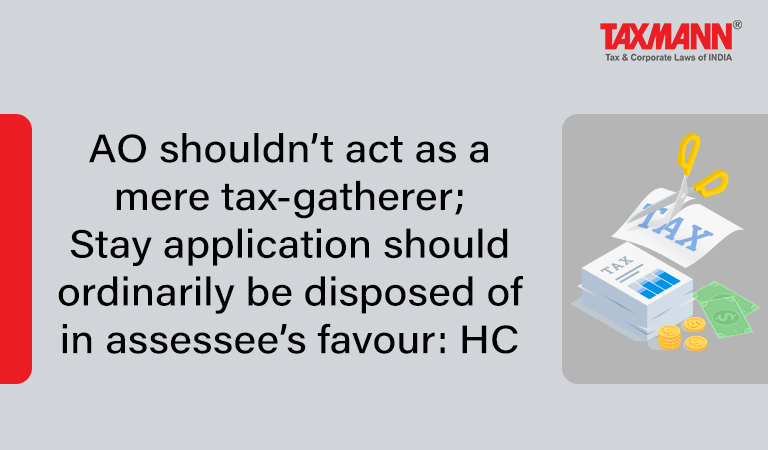AO shouldn’t act as a mere tax-gatherer; Stay application should ordinarily be disposed of in assessee’s favour: HC
- Blog|News|Income Tax|
- 2 Min Read
- By Taxmann
- |
- Last Updated on 21 February, 2022

Case Details: Harsh Dipak Shah v. Union of India - [2022] 135 taxmann.com 242 (Gujarat)
Judiciary and Counsel Details
-
- J.B. Pardiwala and Ms. Nisha M. Thakore, JJ.
- Abhishek M. Mehta for the Petitioner.
- M.R. Bhatt for the Respondent.
Facts of the Case
The Income-tax department conducted a search against the assessee, and, consequently, assessment orders were passed. The total demand raised of Rs. 373,20,42,319.
The assessee challenged the assessment orders passed by the assessing officer (AO) by filing appeals before the CIT(A). The assessee also preferred separate stay applications before the assessing officer with a prayer to stay the demand as raised for the assessment years under consideration. The assessee sought a stay of demand on the ground of high-pitched assessment and pending appeal before CIT(A). However, the assessing officer rejected the stay application of assessee.
High Court Held
Being dissatisfied with the order of the assessing officer, the assessee filed a writ petition before the High Court. The High Court allowed the writ petition of the assessee and made the following observations in its judgment:
(a) Application u/s 220(6) for a stay of demand is to be decided by AO based on 4 basic parameters; (i) prima facie case, (ii) balance of convenience, (iii) irreparable injury to the assessee, and (iv) whether the assessee has come with clean hands.
(b) While deciding on stay of demand application u/s 220(6), AO should divorce himself from his position as the authority who made the assessment.
(c) AO may stipulate a pre-deposit of less than 20% of demand (even 5%/10%) while granting the stay of demand u/s 220(6).
(d) AO’s discretion of not treating the assessee in default, conferred under section 220(6) should ordinarily be exercised in favor of the assessee, unless the overriding and overwhelming reasons are there to reject the application.
(e) The application under Section 220(6) of the Act cannot normally be rejected merely by describing it as against the interest of Revenue if recovery is not made if the tax demanded is twice or more of the declared tax liability.
(f) Powers to grant stay can be implied as an inherent power of the First Appellate Authority, i.e., CIT(A).
Disclaimer: The content/information published on the website is only for general information of the user and shall not be construed as legal advice. While the Taxmann has exercised reasonable efforts to ensure the veracity of information/content published, Taxmann shall be under no liability in any manner whatsoever for incorrect information, if any.

Taxmann Publications has a dedicated in-house Research & Editorial Team. This team consists of a team of Chartered Accountants, Company Secretaries, and Lawyers. This team works under the guidance and supervision of editor-in-chief Mr Rakesh Bhargava.
The Research and Editorial Team is responsible for developing reliable and accurate content for the readers. The team follows the six-sigma approach to achieve the benchmark of zero error in its publications and research platforms. The team ensures that the following publication guidelines are thoroughly followed while developing the content:
- The statutory material is obtained only from the authorized and reliable sources
- All the latest developments in the judicial and legislative fields are covered
- Prepare the analytical write-ups on current, controversial, and important issues to help the readers to understand the concept and its implications
- Every content published by Taxmann is complete, accurate and lucid
- All evidence-based statements are supported with proper reference to Section, Circular No., Notification No. or citations
- The golden rules of grammar, style and consistency are thoroughly followed
- Font and size that’s easy to read and remain consistent across all imprint and digital publications are applied



 CA | CS | CMA
CA | CS | CMA
